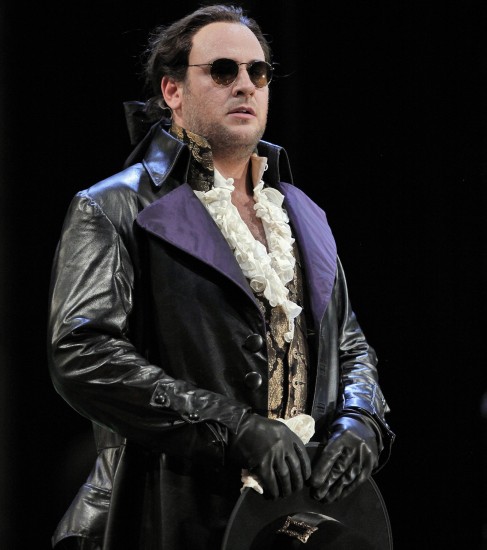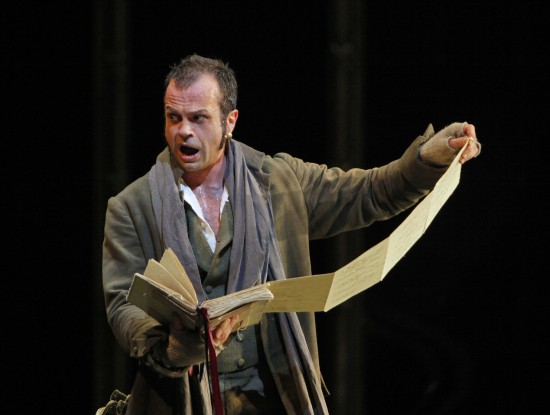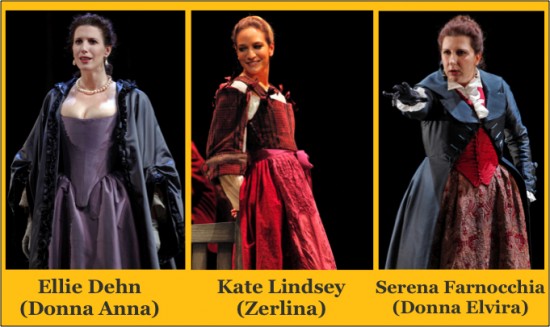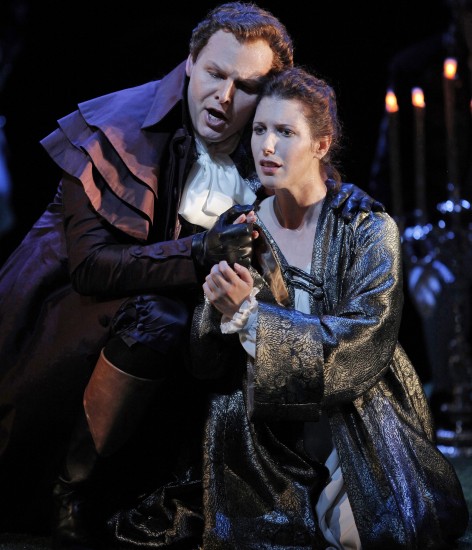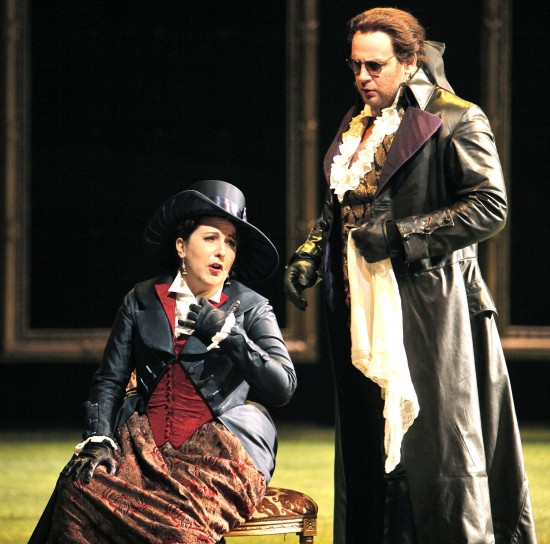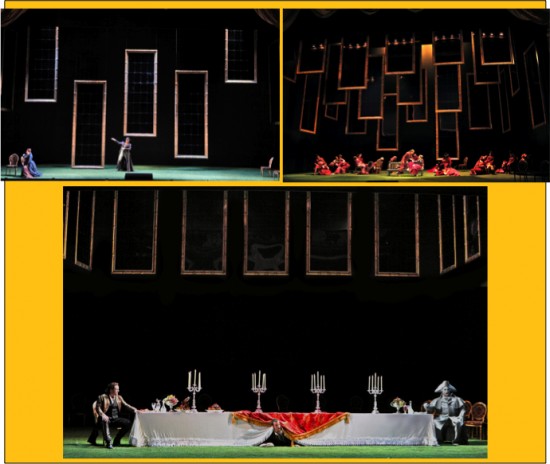The Opera season 2011-12 could well be called “The Year of the Don”. In the space of four months I am planning to see four different productions of Mozart’s masterpiece – two live stage performances and two on HD:
San Francisco Opera last Tuesday, Oct. 18
Metropolitan Opera HD the end of October
La Scala HD in January, and
West Bay Opera in February.
C’est formidable, n’est-ce pas?
You have probably seen Don Giovanni many times, so it is unnecessary for me to review the plot. For those of you who don’t know it, you still have many chances to see this production (it plays through November 11), and I don’t want to spoil the suspense. Therefore, I’ll merely introduce the eight characters with particular reference to the artists whom I saw in this SF Opera production.
The title character Don Giovanni (Lucas Meachem) is that compelling figure of myth, Don Juan: a man of unbelievable sexual prowess. His charm is irresistible to most women, and he has sufficient physical strength, wealth, and noble rank to overcome most of the rest.
Indeed, if we are to believe the journal kept by his servant Leporello (Marco Vinco), his list of conquests includes *
In Verona, six hundred and forty,
Down for Dresden, two hundred eleven;
France and Turkey, a mere ninety seven.
Ah, but in Spain, ah! Here already
Are one thousand plus
One, two, three. One, two, three.
Despite all of his past successes and his unbounded self-confidence, Don Giovanni is totally unfulfilled during the twenty-four hours of his life presented on stage. It’s not for lack of trying, but he doesn’t succeed in bedding any of the three sopranos in the opera or any of the women he encounters off-stage.
There are those who claim that Don Giovanni is Mozart’s greatest opera – or even the world’s greatest opera. Musically, I won’t argue with them, but it’s not the greatest opera-as-a-whole. There is little character development, and the plot and sub-plots are rather static – up until the final dramatic conclusion. In my mind the Greatest operas have one thing in common: the opera-as-a-whole is greater than the sum of its parts. The parts here are all Great, but in this case their sum is just their sum.
As for the parts, let’s start with the Commendatore (Morris Robinson). He appears only twice. In the opening scene he is killed in a duel with Giovanni (which he foolishly provoked), but he returns as his statue at the very end of the opera – with chilling effect. The bits that he gets to sing are profound and are sung in a magnificent bass voice.
His daughter Donna Anna (Ellie Dehn) and her fiancÉ Don Ottavio (Shawn Mathey) have some of the best music in the opera – both as soloists and in duo. Anna starts off strong, resisting Giovanni’s attempted rape and screaming for help. Then her father is killed, and she becomes a monomaniac in her protestations of grief and insistence upon revenge. After the first few words, I recommend studiously keeping your eyes away from the repetitive supertitles and concentrating on the glorious music.
Her boyfriend Ottavio is even worse. He is full of great melodies and boastful words delivered in a fine tenor voice, but he is totally empty of any deeds to match. He keeps singing that he’ll kill Giovanni, but the only time he stirs himself it’s to go running off for the police. He’s such a wimp that part of me resents his getting such gorgeous music.
Zerlina (Kate Lindsey) is totally different. She’s a peasant lass filled with natural charm and vivacity. She’s got lots of street smarts but is totally unprepared to resist Giovanni’s urbane charms and facile promises of marriage.
Masetto (Ryan Kuster), her rather oafish fiancÉ, doesn’t like the idea (surprise, surprise), but is cowed when Giovanni pulls rank: *
Enough! No more tomfoolery! You’ll go without a grumble,
Or delay will cost you dearly
Masetto, go or else! Do I speak clearly?
Things look bleak for Zerlina’s virtue, but the third soprano shows up in the nick of time. Some years before the opera opened, Donna Elvira (Serena Farnocchia) spent a night in bed with Giovanni, happy in the belief that they would be wed on the morrow. But came the dawn, he was gone – and Elvira set out successfully to find him. Like Anna, she is a monomaniac, but she still loves the bastard and her sole aim in life is to follow him around and thwart his predatory plans by informing (in beautiful music, of course) his intended victims of the true nature of the beast.
Sounds pretty grim, huh? The main theme is, indeed, both sad and terrifying – but it is perfectly balanced by some of the comic antics of Zerlina and Masetto, and by the superb athletic and comic acting of Marco Vinco’s Leporello. I can’t recall seeing any operatic performance where a character spent so much time picking himself up from the floor – without missing a beat!
The direction was crisp throughout. In particular, the diabolical finale to Act II was restrained and extremely effective. Director Gabriele Lavia boldly decided to omit the Epilog. I fully agree with the wisdom of that decision. Opera audiences in 18th century Prague demanded happy endings. 21st San Francisco audiences are made of stronger stuff. I want a chance to savor the grim justice of a rotter and rouÉ getting his just desserts.
With only a couple of additions, the “sets” consisted solely of a number of large rectangular somewhat reflective “mirrors” raised and lowered in a brilliant variety of patterns to indicate scene and mood changes. Except for the banquet table in the last scene, the props were equally sparse: only a few period chairs for the most part. It all helped concentrate on the intricacies of the plot and the wonderful, wonderful music. No matter how many times you may have seen Don Giovanni in the past, this is one you don’t want to miss.
The Opera Nut
* English translations within this review are by Donald Pippin, Opera in English, Volume I: Mozart, Donald Pippin’s Pocket Opera, San Francisco.
San Francisco Opera
301 Van Ness Avenue
San Francisco, CA 94102
(415) 861-4008
sfopera.com
DON GIOVANNI
Wolfgang Amadeus Mozart
Libretto by Lorenzo Da Ponte
Sung in Italian with English supertitles
Approximate running time: 3 hours, 10 minutes including one intermission
PERFORMANCES:
Tue 10/18/11 8:00pm
Fri 10/21/11 8:00pm
Sun 10/23/11 2:00pm
Wed 10/26/11 7:30pm
Wed 11/2/11 7:30pm
Sat 11/5/11 2:00pm
Thu 11/10/11 7:30pm
Except as indicated, all photos by Cory Weaver, San Francisco Opera
Supertitles by Philip Kuttner
This review by Philip G Hodge appeared in sanfranciscosplash.com on October 22, 2011

